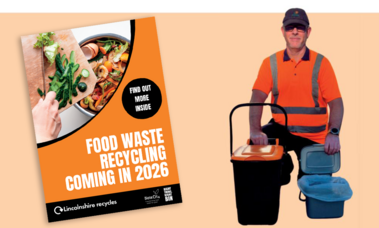
New food recycling changes happening in Spring 2026
From Spring 2026, residents across Lincolnshire will see a significant change in the way food waste is collected and managed. As part of a national initiative under the Environment Act 2021, Lincolnshire will be introducing weekly food waste collections for all households across the county.
Towards the end of January 2026, the delivery of the caddies will begin ready for collections to start in North Kesteven from Monday 30th March 2026.
What will residents recieve?
- A small caddy for collecting food scraps
- A larger outdoor caddy for collection
- An initital supply of caddy liners
- Full instructions and collection schedule
The aim of this new collection is to make it easier for residents to recycle food waste and help reduce the environmental impact of waste disposal. Lincolnshire households currently produce an estimated 30,000 to 35,000 tonnes of food waste each year, much of which ends up being incinerated. By separating this waste, it can instead be sent to anaerobic digestion facilities, where it is turned into biogas to generate energy and nutrient-rich fertiliser for local farmland.
What can go in the food waste caddy?
Residents will be able to recycle all food waste, including:
· Plate scrapings - All uneaten food and plate scrapings
· Meat and bones - Raw meat, cooked meat and meat bones
· Fish - Raw fish, cooked fish and fish bones
· Dairy - Yoghurts, cheese, eggs and butter
· Fruit and veg - Raw vegetables, cooked vegetables, whole fruit, peelings
· Tea bags and coffee grounds
· Rice, pasta and beans
· Bread, cakes and pastries
Even mouldy food, oils and fats can go in the kitchen caddy and any unused pet food (remove packaging).
Even if residents compost at home, using the food waste caddy for items like meat, dairy and cooked food is encouraged, as these aren’t suitable for most home compost bins.
Early trials and national data have shown that introducing separate food waste collections can improve household recycling rates by around 7% and reduce CO₂ emissions significantly — by over 4,400 tonnes annually in Lincolnshire alone.
With the engagement of all our resident in this new food waste collection service, everyone will be helping to turn leftovers into something useful — clean energy and local fertiliser — and supporting a greener future for Lincolnshire.
For more details, visit the council’s food waste webpage at: http://www.n-kesteven.gov.uk/foodwaste
